16. Kinh Pháp Cú – Chương 16: Phẩm Hỷ Ái – Affection – Song ngữ
Dhammapada Sutta (The Path of Truth)
Kinh Pháp Cú
English: Bhikkhu Khantipalo & Sister Susanna, 1993
Vietnamese: Thích Minh Châu, 1996
Illustrated Photos: Venerable-mahasi-sayadaw
Compile: Lotus group
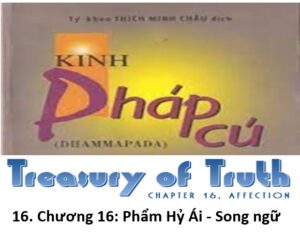
Chapter 16: Piya Vagga – Affection (Verse 209-220)
16. Chương 16: Kinh Pháp Cú – Giảng Lược Phẩm Hỷ Ái – Song ngữ
Verse 209. Admiration of Self-Seekers
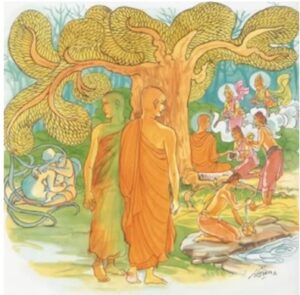
One makes an effort where none’s due
With nothing done where effort’s due,
One grasps the dear, gives up the Quest
Envying those who exert themselves.
“Tự chuyên, không đáng chuyên
Không chuyên, việc đáng chuyên.
Bỏ đích, theo hỷ ái,
Ganh tị bậc tự chuyên.”
Explanation:
Giving himself to things to be shunned and not exerting where exertion is needed, a seeker after pleasures, having given up his true welfare, envies those intent upon theirs.
- Chuyên tâm làm những việc không đáng làm, nhác tu những điều cần tu, bỏ việc lành mà chạy theo dục lạc, người như thế dù có hâm mộ kẻ khác đã cố gắng thành công, cũng chỉ là hâm mộ suông [1].
Verse 210. Not seeing the liked and seeing the unlike are Both Painful
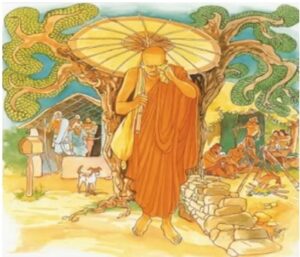
Don’t consort with dear ones
At any time, nor those not dear,
‘Is dukkha not to see the dear,
‘Tis dukkha seeing those not dear.
“Chớ gần gũi người yêu,
Trọn đời xa kẻ ghét.
Yêu không gặp là khổ,
Oán phải gặp cũng đau.”
Explanation:
Seek no intimacy with the beloved and also not with the unloved, for not to see the beloved and to see the unloved, both are painful.
210. Chớ kết giao với người đáng ưa, chớ kết giao với người không đáng ưa. Không gặp được người thương yêu là khổ, gặp người cừu oán cũng khổ.
Verse 211. Not Bound By Ties of Defilements
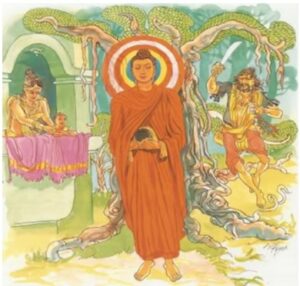
Others then do not make dear
For hard’s the parting from them.
For whom there is no dear, undear
In them no bonds are found.
“Do vậy chớ yêu ai,
Ái biệt ly là ác;
Những ai không yêu ghét,
Không thể có buộc ràng.”
Explanation:
Therefore, hold nothing dear, for separation from the dear is painful. There are no bonds for those who have nothing beloved or unloved.
- Thế nên chớ đắm yêu, vì đắm yêu bị biệt ly là khổ. Nếu không còn những niệm yêu ghét, thì không điều gì ràng buộc được.
Verse 212. The Outcome of Endearment
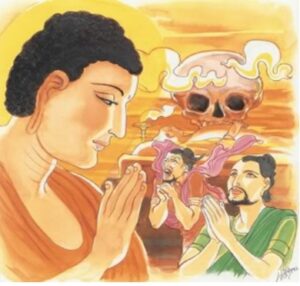
From endearment grief is born,
From endearment fear,
One who is endearment-free
Has no grief – how fear.
“Do ái sinh sầu ưu,
Do ái sinh sợ hãi,
Ai thoát khỏi tham ái,
Không sầu, đâu sợ hãi?”
Explanation:
Therefore, hold nothing dear, for separation from the dear is painful. There are no bonds for those who have nothing beloved or unloved.
- Từ hỷ ái sinh lo, từ hỷ ái sinh sợ; xa lìa hết hỷ ái, chẳng còn lo sợ gì.
Verse 213. Sorrow and Fear Arise Due To Loved Ones
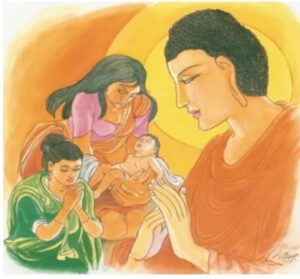
From affection grief is born,
From affection fear,
One who is affection-free
Has no grief – how fear?
“Ái luyến sinh sầu ưu,
Ái luyến sinh sợ hãi.
Ai giải thoát ái luyến
Không sầu, đâu sợ hãi?”
Explanation:
From affection springs grief, from affection springs fear. For him who is wholly free from affection there is no grief, whence then fear?
- Từ tham ái sinh lo, từ tham ái sinh sợ ; xa lìa hết tham ái, chẳng còn lo sợ gì.
Verse 214. The Outcome of Passion
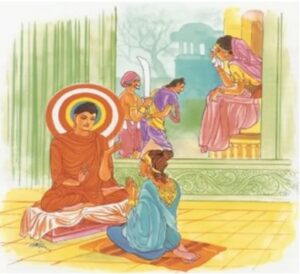
From lustfulness arises grief,
From lustfulness springs fear,
One wholly free of lustfulness
Has no grief – how fear?
“Hỷ ái sinh sầu ưu,
Hỷ ái sinh sợ hãi.
Ai giải thoát hỷ ái,
Không sầu, đâu sợ hãi?
Explanation:
From attachment springs grief, from attachment springs fear. For him who is wholly free from attachment there is no grief, whence then fear?
- Từ tham dục sinh lo, từ tham dục sinh sợ ; xa lìa hết tham dục, chẳng còn lo sợ gì.
Verse 215. The Outcome of Lust

From attachment grief is born,
From attachment fear,
One who is attachment-free
Has no grief – how fear?
“Dục ái sinh sầu ưu,
Dục ái sinh sợ hãi,
Ai thoát khỏi dục ái,
Không sầu, đâu sợ hãi?”
Explanation:
From lust springs grief, from lust springs fear. For him who is wholly free from lust there is no grief, whence then fear?
- Từ lạc dục sinh lo, từ lạc dục sinh sợ; xa lìa hết lạc dục, chẳng còn lo sợ gì.
Verse 216. Sorrow and Fear Arise Due To Miserliness
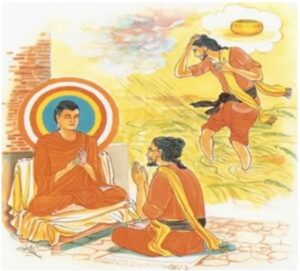
Out of craving grief is born,
Out of craving fear,
One fully freed of craving
Has no grief – how fear?
“Tham ái sinh sầu ưu,
Tham ái sinh sợ hãi.
Ai thoát khỏi tham ái,
Không sầu, đâu sợ hãi.”
Explanation:
From craving springs grief, from craving springs fear. For him who is wholly free from craving there is no grief; whence then fear?
- Từ ái dục sinh lo, từ ái dục sinh sợ ; xa lìa hết ái dục, chẳng còn lo sợ gì.
Verse 217. Beloved of the Masses
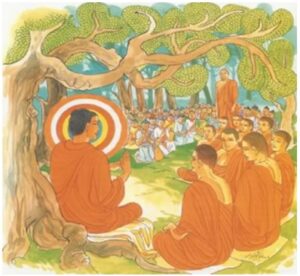
Perfect in virtue and insight,
Firm in Dhamma, knower of Truth,
Dear to the people’s such a one
Who does what should be done.
“Ðủ giới đức, chánh kiến;
Trú pháp, chứng chân lý,
Tự làm công việc mình,
Ðược quần chúng ái kính.”
Explanation:
People hold dear him who embodies virtue and insight, who is principled, has realized the truth, and who himself does what he ought to be doing.
- Đầy đủ giới hạnh và chánh kiến, an trú Chánh pháp, rõ lý Chơn thường, viên mãn các công hạnh, ấy mới là người đáng ái mộ.
Verse 218. The Person with Higher Urges
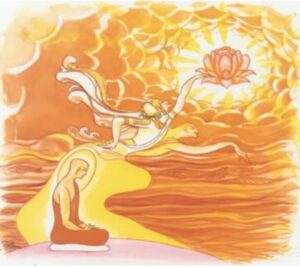
One with a wish for the Undeclared,
With mind so well-pervaded,
A mind not bound in pleasures of sense,
An ‘upstream-goer’s’ called.
“Ước vọng pháp ly ngôn
Ý cảm xúc thượng quả
Tâm thoát ly ác dục,
Xứng gọi bậc Thượng Lưu.”
Explanation:
One who is intent upon the Ineffable (Nibbana), dwells with mind inspired (by supramundane wisdom), and is no more bound by sense pleasures – such a man is called “One Bound Upstream”.
- Khát cầu pháp ly ngôn, sung mãn tâm cứu xét, không đắm mê dục lạc, ấy là bậc thượng lưu [2].
Verse 219. The Fruits of Good Action
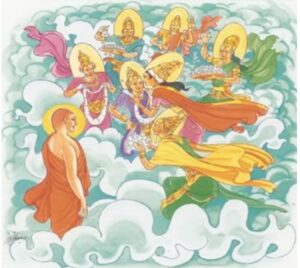
One who’s long away from home
Returns in safety from afar,
Then friends, well-wishers, kinsmen too
Are overjoyed at his return.
“Khách lâu ngày ly hương
An toàn từ xa về,
Bà con cùng thân hữu,
Hân hoan đón chào mừng.”
Verse 220. Good Actions Lead to Good Results
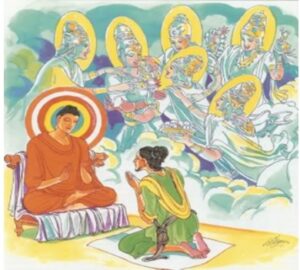
In the same way, with merit done
When from this world to another gone
Those merits then receive one there
As relatives a dear one come.
“Cũng vậy các phước nghiệp,
Ðón chào người làm lành,
Ðời này đến đời kia.
Như thân nhân, đón chào.”
Explanation:
When, after a long absence, a man safely returns home from afar, his relatives, friends and well-wishers welcome him home on arrival.
As kinsmen welcome a dear one on arrival, even so his own good deeds will welcome the doer of good who has gone from this world to the next.
- 220. Người khách ly hương lâu ngày, từ phương xa trở về an ổn, được bà con thân hữu đón mừng như thế nào, thì người tạo phước nghiệp cũng vậy, khi từ cõi đời nầy sang cõi đời khác, phước nghiệp của họ là kẻ thân hữu đón mừng họ.
Chú thích:
[1] Hâm mộ suông: Ý nói những Tỳ kheo vì bị dục lạc mê hoặc, bỏ việc hành đạo để sinh hoạt theo thế tục, sau thấy kẻ khác tu hành có kết quả lại tỏ lòng hối tiếc hâm mộ, nhưng kỳ thật tự mình thì trống rỗng không được gì cả.
[2] Bậc thượng lưu (Ubddharmsoto), chỉ cho quả vị Bất hoàn (Anagami) gần đến Niết bàn A la hán.

Sources:
Tài liệu tham khảo:
- http://thanhtruc-thanhtrucgdth.blogspot.com/2011/02/kinh-phap-cu.html
- http://www.buddhanet.net/dhammapada/d_affect.htm
- http://motleydogs.com/2012/11/12/funny-dog-and-cat-photos-with-captions-5/
- Tam Tu Metta Buddhist Temple & Heritage Garden – 610 Fisher Ave, Morgan Hill, CA 95037
- https://quangduc.com/a29858/kinh-phap-cu-chu-giai-tap-3
